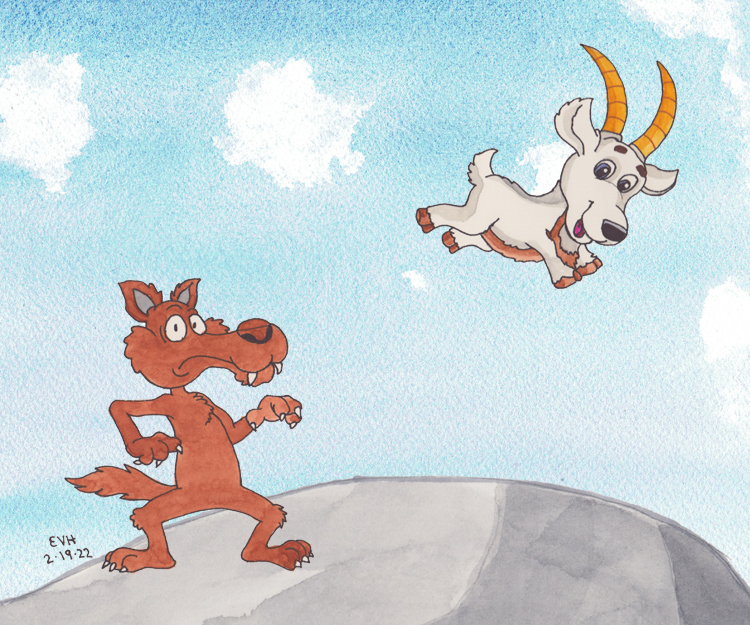
Jataka 300
Vaka Jātaka
The Wolf
as told by Eric Van Horn
originally translated by William Henry Denham Rouse, Cambridge University
originally edited by Professor Edward Byles Cowell, Cambridge University
This story is a little garbled, but it is basically about weak or poor resolve. In the story in the present, some monks keep special vows only as long as it is convenient, in this case in order to be able to see the Buddha. And in the Jātaka Tale itself, a wolf keeps a holy day fast only because he is forced to.
“The wolf who takes.” The Master told this story at Jetavana. It is about old friendship. The circumstances were the same in detail as in the Vinaya. This is an abstract of them.
(This story is in the Mahavagga 1.31.3. In it the Buddha rebukes a monk named Upasena for performing an ordination ceremony even though he himself had only been ordained for two years. This led to the monastic rule that only those who had been fully ordained for 10 years could perform the ordination ceremony, and at least 10 monks who had been ordained for 10 years had to be present. The passage in the Mahavagga read, “Then the Great Buddha rebuked him. ‘This is improper, O foolish one, unbecoming, unsuitable, unworthy of a monk, unallowable, and to be avoided. How can you, O foolish one, who ought to receive exhortation and instruction from others, think yourself fit for administering exhortation and instruction to another monk? Too quickly, O foolish one, have you taken up to the ambition of collecting followers. This will not do. Let no one, O monks, confer the upasampada (novice) ordination who has not completed ten years. He who does, is guilty of a dukkata offence (one that requires confession). I prescribe, O monks, that only he who has completed ten years or more than ten years, may confer the upasampada ordination.’” –[Mv 1.31.5])
The reverend Upasena, having been ordained for two years, visited the Master along with a first-year monk who lived in the same monastery. The Master rebuked him, and he retired.
Having acquired spiritual insight and become an arahant, having gotten contentment and kindred virtues, having undertaken the Thirteen Practices of a Recluse (these are special set of austerities called the “dhutanga” that some monks undertake but are not required), and taught them to his fellows while the Blessed One was secluded for three months, he with his monks, having accepted the blame first given for wrong speech and nonconformity, received in the second instance approval with the words, “Henceforth, let any monks visit me when they will, provided they follow the Thirteen Practices of a Recluse.”
Thus encouraged, he returned and told it to the Saṇgha. After that, the brothers followed these practices before coming to visit the Master. Then, when he had come out from his seclusion, they would throw away their old rags and put on clean garments. (They would abandon the special vows.) As the Master with the whole Saṇgha went round to inspect the rooms, he noticed these rags lying about and asked what they were. When they told him, he said, “Brethren, the practice undertaken by these brothers is short-lived like the wolf’s holy day service,” and he told them this story from the past.
Once upon a time, when Brahmadatta reigned as King in Benares, the Bodhisatta came to life as Sakka, king of the gods. At that time a wolf lived on a rock by the Ganges bank. The winter floods came up and surrounded the rock. There he lay on the rock, with no food and no way of getting it. The water rose and rose, and the wolf pondered, “There is no food here, and there is no way to get it. Here I lie with nothing to do. I may as well keep a sabbath fast.” Thus resolved to keep a sabbath, as he lay he solemnly resolved to keep the holy precepts. Sakka in his meditations perceived the wolf’s weak resolve. He thought, “I’ll plague that wolf.” And taking the shape of a wild goat, he stood nearby and let the wolf see him.
“I’ll keep sabbath another day!” thought the Wolf, as he saw the goat. Up he got, and he leaped at the creature. But the goat jumped about so that the wolf could not catch him. When our wolf saw that he could not catch him, he came to a standstill and went back, thinking to himself as he lay down again, “Well, my sabbath is not broken after all.”

Figure: Teasing the wolf
Then Sakka, by his divine power, hovered above in the air. He said, “What have such as you, all unstable, to do with keeping a sabbath? You didn’t know that I was Sakka, and you wanted a meal of goat’s flesh!” And thus plaguing and rebuking him, he returned to the world of the gods.
“The wolf, who takes live creatures for his food,
And makes a meal upon their flesh and blood,
Once undertook a holy vow to pay,
Made up his mind to keep the sabbath day.
“When Sakka learned what he resolved to do,
He made himself a goat to outward view.
Then the blood-drinker leaped to seize his prey,
His vow forgot, his virtue cast away.
“Even so some persons in this world of ours,
That make resolves which are beyond their powers,
Swerve from their purpose, as the wolf did here
As soon as he beheld the goat appear.”
When the Master had ended this discourse, he identified the birth as follows: “At that time I was Sakka.”
